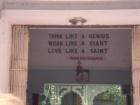God and the Economists
Apparently the Monty Hall test is one that Wall Street firms commonly use to see if potential applicants are suitable material for the madness that is a trading desk in the heartlands of financeland. In so using the test these corporations are, knowingly or not, addressing some of the most hard to overcome behavioural biases that often defeat legions of unprepared investors.
In fact, this particular test has been a source of delight for grant seeking academics of all persuasions. The thing is that the Monty Hall test can be explained in many different ways, most of them simultaneously contradictory. However, it does increasingly look like this blatantly irrational behaviour is hard-wired into our neurons. It seems God really doesn't like economists.
Stick or Twist?
For those who don't know – and it's hard to believe that there are many people left in that category – the Monty Hall problem is usually described in terms of a twentieth century gameshow hosted by the eponymous Monty. In the game contestants were given a choice of three closed doors two of which hid a goat and the other a car. Once the contestant had chosen a door Monty would throw open one of the other two ... to reveal a goat. The question is, on the assumption they prefer the car to the goat, should the contestant now stick with their original choice or twist, and select the other closed door?
The answer is that they should change their mind. This answer usually generates a whole host of angry responses, often from mathematicians and statisticians, but is correct under most reasonable assumptions. Basically the reason is that when you make your original choice the door you choose has a one in three chance of being the car while there's a two in three chance of it being behind the other two. When Monty opens his closed door your door's odds don't change, and neither do the odds on the combination of the other doors.
Disbelievers, Repent
Most of us – me included – initially find this unbelievable and spend hours frantically manipulating card decks in a furious attempt to show that this is incorrect. But it isn't, and the key to understanding this is that Monty already knows where the car is, and his knowledge changes the odds. It's an important…
Good article, timarr, and one that raises some interesting issues. I'm especially interested, as I have known fewer than 10 really good traders in the 20 years I worked in and around bank trading rooms.
the key to understanding this is that Monty already knows where the car is, and his knowledge changes the odds. It's an important lesson for stockpickers when they're dealing with people who know more than them.
This point resonates....though I also think of Rumsfeld and his "unknown unknowns" compared to his "known unknowns". I observed, over many years, that the best traders are extremely willing to change their mind and cut their positions....and that this is often on the basis that "the market knows something that they don't". At one level of course this is extremely rational (as with your Monty Hall example), because they KNOW that there are people out there who COULD know more than them. But they aren't certain that is the case - sometimes it is just a random market move - and at other times it proves a temporary blip due to someone buying or selling through another bank. Of course if one doesn't know the end customer first hand, then one is always guessing.....but, in the short term, it is not irrational to assume that "someone knows something" and the odds have changed.
A recent example of where this proved completely wrong, however, was in SOCO shares last week - which suddenly rallied by £1 to nearly £18, following an RNS which every well-informed SOCO-watcher immediately dismissed as irrelevant (concerning a rig for CNV). Ex-post one can fairly clearly see that some institution or dealer had misinterpreted the RNS as indicating that drilling was starting early on a different field (TGD).....but, at the time, the assumption was that "someone knows something" and further, more important, news was...err....imminent. But no doubt people were suckered into the strong move upwards and backed the speculative surge with fresh money.
The other explanations rely more on the concepts of behavioural psychology. So this could be an outcome of the illusion of control, with participants believing that they're exercising skill and that the sight of an empty door merely shows that they've already chosen correctly. Or it could be a side-effect of the status quo effect where people are markedly reluctant to give up something they already own in exchange for something else – probably because they'd feel worse if it turned out what they'd given up was more valuable than what they'd accepted. Sins of commission are always felt more than sins of omission.
I'm an LTBH investor who has worked with a lot of traders, both good and bad. I'd observe that I am perhaps prone to the status quo effect, in having failed on several occasions to sell a share that I knew I knew very well and was confident about for the long term..... despite which the price fell as a result of people taking shorter-term views. Plainly in the 2008 slump in stock markets, the correct course of action was to sell everything asap and wait for the slump to bottom out - but it is difficult for an LTBH investor to do such things when nothing fundamentally has changed, especially when he knows he has superior knowledge to the market as a whole.
On the other hand, the weaker traders I have seen over the years have been more prone to the first error you mention above - which is assuming that they have chosen correctly. Traders have no loyalty to (or indeed usually much by way of fundamental understanding of) any asset they trade.....but the poor traders will often cling to losing positions. Nick Leeson is a case in point.
If people can't stop behavioural biases preventing them from solving relatively simple problems like this then what chance do they have of managing themselves in the maelstrom of markets? As usual what Monty Hall proved is that it's better to be opening the doors when you know what's behind them than guessing blindly and stupidly when you don't.
Good question - which is why it is an excellent test for potential traders!
Your closing comment is also clearly correct, but I am left wondering about the influence of the passage of time between the decision point and the revelation of the outcome. In the trading example, of course, this really doesn't matter......timescales are short and the results are more or less immediate - and that is all that matters for traders. However, I'm left wondering about the impact of time in the context of investment......
I have often been content to accept many months (sometimes, rarely, a year or two) of underperformance of an investment because I judge that, in the long run, I will still come out well ahead. Obviously, if I can see such a period coming with a high level of certainty, I would sell and re-enter....but it is rare that markets give such opportunities. Traders (including users of some forms of TA) would effectively assume at some point that "someone knows something" and sell - but that does NOT exclude the possibility of, for example, a takeover bid from someone who is ALSO taking a long-term view.
So I guess this leaves me wondering about two things in your examples:
1) what is the impact of different market participants having different time investment time horizons?
2) what is the impact of heterogenous market participants, in particular the possibility of M&A interest from industry players who may be using different valuation metrics from those that are commonly assumed to be relevant by financial market participants?
rgds
ee









